ABC Codes are five-digit alpha codes (e.g., AAAAA) used by licensed and non-licensed healthcare practitioners to supplement medical codes (e.g. CPT and HCPCS II) on standard electronic (e.g. American National Standards Institute, Accredited Standards Committee X12 N 837P healthcare claims and on standard paper claims (e.g., CMS 1500 Form) to describe services, remedies and/or supply items provided and/or used during patient visits. ABC codes contain both a short description (e.g. 80 characters or less) and an expanded definition of the service, remedy and/or supply item. ABC codes were created and designed by ABC Coding Solutions.
ABC codes fill gaps in healthcare administrative coding that conventional medical code sets do not cover and support preferred provider contracting, claims, payments and comparative outcome studies. Additionally, ABC codes are tied to state legislative references regarding scope of practice and training requirements on a code, state and practitioner-specific basis.

Naturopathy, or naturopathic medicine, is a form of alternative medicine. A wide array of practices branded as "natural", "non-invasive", or promoting "self-healing" are employed by its practitioners, who are known as naturopaths. Difficult to generalize, these treatments range from the pseudoscientific and thoroughly discredited, like homeopathy, to the widely accepted, like certain forms of psychotherapy. The ideology and methods of naturopathy are based on vitalism and folk medicine rather than evidence-based medicine, although practitioners may use techniques supported by evidence. The ethics of naturopathy have been called into question by medical professionals and its practice has been characterized as quackery.

A psychologist is a professional who practices psychology and studies mental states, perceptual, cognitive, emotional, and social processes and behavior. Their work often involves the experimentation, observation, and interpretation of how individuals relate to each other and to their environments.
Traceability is the capability to trace something. In some cases, it is interpreted as the ability to verify the history, location, or application of an item by means of documented recorded identification.

Health informatics is the study and implementation of computer structures and algorithms to improve communication, understanding, and management of medical information. It can be viewed as a branch of engineering and applied science.
Health Level Seven, abbreviated to HL7, is a range of global standards for the transfer of clinical and administrative health data between applications with the aim to improve patient outcomes and health system performance. The HL7 standards focus on the application layer, which is "layer 7" in the Open Systems Interconnection model. The standards are produced by Health Level Seven International, an international standards organization, and are adopted by other standards issuing bodies such as American National Standards Institute and International Organization for Standardization. There are a range of primary standards that are commonly used across the industry, as well as secondary standards which are less frequently adopted.

Gua sha, or kerokan, is a traditional Chinese medicine (TCM) practice in which a tool is used to scrape people's skin in order to produce light petechiae. Practitioners believe that gua sha releases unhealthy bodily matter from blood stasis within sore, tired, stiff, or injured muscle areas to stimulate new oxygenated blood flow to the areas, thus promoting metabolic cell repair, regeneration, healing, and recovery.

Primary care is the day-to-day healthcare given by a health care provider. Typically this provider acts as the first contact and principal point of continuing care for patients within a healthcare system, and coordinates other specialist care that the patient may need. Patients commonly receive primary care from professionals such as a primary care physician, a physician assistant, a physical therapist, or a nurse practitioner. In some localities, such a professional may be a registered nurse, a pharmacist, a clinical officer, or an Ayurvedic or other traditional medicine professional. Depending on the nature of the health condition, patients may then be referred for secondary or tertiary care.
Medical billing is a payment practice within the United States healthcare system. The process involves the systematic submission and processing of healthcare claims for reimbursement. Once the services are provided, the healthcare provider creates a detailed record of the patient's visit, including the diagnoses, procedures performed, and any medications prescribed. This information is translated into standardized codes using the appropriate coding system, such as ICD-10-CM or Current Procedural Terminology codes—this part of the process is known as medical coding. These coded records are submitted by medical billing to the health insurance company or the payer, along with the patient's demographic and insurance information. Most insurance companies use a similar process, whether they are private companies or government sponsored programs. The insurance company reviews the claim, verifying the medical necessity and coverage eligibility based on the patient's insurance plan. If the claim is approved, the insurance company processes the payment, either directly to the healthcare provider or as a reimbursement to the patient. The healthcare provider may need to following up on and appealing claims.

A nurse practitioner (NP) is an advanced practice registered nurse and a type of mid-level practitioner. NPs are trained to assess patient needs, order and interpret diagnostic and laboratory tests, diagnose disease, prescribe medications and formulate treatment plans. NP training covers basic disease prevention, coordination of care, and health promotion.

In international trade, market access refers to a company's ability to enter a foreign market by selling its goods and services in another country. Market access is not the same as free trade, because market access is normally subject to conditions or requirements, whereas under ideal free trade conditions goods and services can circulate across borders without any barriers to trade. Expanding market access is therefore often a more achievable goal of trade negotiations than achieving free trade.
Infection prevention and control is the discipline concerned with preventing healthcare-associated infections; a practical rather than academic sub-discipline of epidemiology. In Northern Europe, infection prevention and control is expanded from healthcare into a component in public health, known as "infection protection". It is an essential part of the infrastructure of health care. Infection control and hospital epidemiology are akin to public health practice, practiced within the confines of a particular health-care delivery system rather than directed at society as a whole.
A Regional Health Information Organization, also called a Health Information Exchange Organization, is a multistakeholder organization created to facilitate a health information exchange (HIE) – the transfer of healthcare information electronically across organizations – among stakeholders of that region's healthcare system. The ultimate objective is to improve the safety, quality, and efficiency of healthcare as well as access to healthcare through the efficient application of health information technology. RHIOs are also intended to support secondary use of clinical data for research as well as institution/provider quality assessment and improvement. RHIO stakeholders include smaller clinics, hospitals, medical societies, major employers and payers.
A National Provider Identifier (NPI) is a unique 10-digit identification number issued to health care providers in the United States by the Centers for Medicare and Medicaid Services (CMS). The NPI has replaced the Unique Physician Identification Number (UPIN) as the required identifier for Medicare services, and is used by other payers, including commercial healthcare insurers. The transition to the NPI was mandated as part of the Administrative Simplifications portion of the Health Insurance Portability and Accountability Act of 1996 (HIPAA).

The California Department of Consumer Affairs (DCA) is a department within the California Business, Consumer Services, and Housing Agency. DCA's stated mission is to serve the interests of California's consumers by ensuring a standard of professionalism in key industries and promoting informed consumer practices. The DCA provides the public with information on safe consumer practices, in an effort to protect the public from unscrupulous or unqualified people who promote deceptive products or services.
Due to the near-universal desire for safe and good quality healthcare, there is a growing interest in international healthcare accreditation. Providing healthcare, especially of an adequate standard, is a complex and challenging process. Healthcare is a vital and emotive issue—its importance pervades all aspects of societies, and it has medical, social, political, ethical, business, and financial ramifications. In any part of the world healthcare services can be provided either by the public sector or by the private sector, or by a combination of both, and the site of delivery of healthcare can be located in hospitals or be accessed through practitioners working in the community, such as general medical practitioners and dental surgeons.

Homeopathy is fairly common in some countries while being uncommon in others. In some countries, there are no specific legal regulations concerning the use of homeopathy, while in others, licenses or degrees in conventional medicine from accredited universities are required.
The Healthcare Common Procedure Coding System is a set of health care procedure codes based on the American Medical Association's Current Procedural Terminology (CPT).
Credentialing is the process of establishing the qualifications of licensed medical professionals and assessing their background and legitimacy.
The Drugs and Cosmetics Rules, 1945 are the rules which the government of India established through the Drugs and Cosmetics Act, 1940. These rules classify drugs under given schedules and present guidelines for the storage, sale, display and prescription of each schedule.
Revenue cycle management (RCM) is the process used by healthcare systems in the United States and all over the world to track the revenue from patients, from their initial appointment or encounter with the healthcare system to their final payment of balance. It is a normal part of health administration. The revenue cycle can be defined as, "all administrative and clinical functions that contribute to the capture, management, and collection of patient service revenue." It is a cycle that describes and explains the life cycle of a patient (and subsequent revenue and payments) through a typical healthcare encounter from admission (registration) to final payment (or adjustment off of accounts receivables). A thriving healthcare revenue cycle reduces and prevents errors. Several factors contribute to errors, but an agile revenue cycle management framework can eliminate these challenges before they occur.